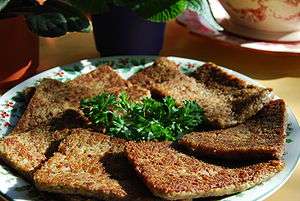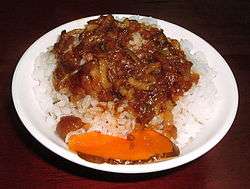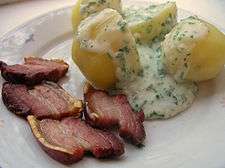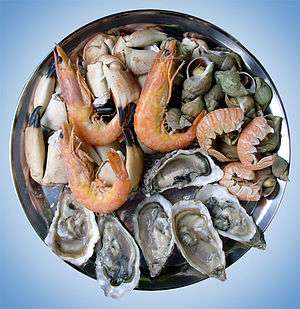List of pork dishes
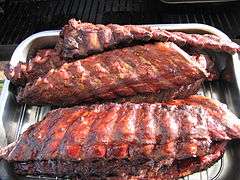
This is a list of pork dishes. Pork is the culinary name for meat from the domestic pig (Sus domesticus). It is one of the most commonly consumed meats worldwide,[1] with evidence of pig husbandry dating back to 5000 BC. Pork is eaten both freshly cooked and preserved.
The consumption of pork is prohibited in Judaism, Islam, and some Christian denominations such as Seventh-day Adventism.
Fresh pork may contain trichinosis, a parasitic disease caused by eating raw or undercooked pork or wild game infected with the larvae of a species of roundworm Trichinella spiralis, commonly called the trichina worm. In the United States, the U.S. Department of Agriculture recommends cooking ground pork to an internal temperature of 160 °F, followed by a 3-minute rest, and cooking whole cuts to a minimum internal temperature of 145 °F, also followed by a 3-minute rest.
Pork dishes
A
B

- Babi guling
- Babi kecap
- Babi panggang
- Bacon Explosion
- Baconique meal
- Bak kut teh
- Bakkwa
- Balchão
- Bandeja paisa
- Bánh canh
- Bánh cuốn
- Bánh tẻ
- Brændende kærlighed
- Bujta repa
- Bulgogi
- Bún bò Huế
- Butadon
C
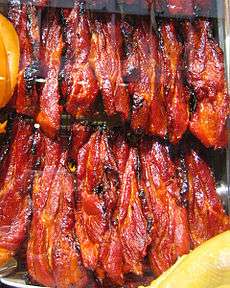
- Cao lầu
- Carne de chango
- Carne de Porco à Alentejana
- Carne de vinha d'alhos
- Carnitas
- Cassoeula
- Chả giò
- Chả lụa
- Cha siu bao
- Chanpuru
- Char siu
- Chicharrón
- Ciccioli
- Cochinita pibil
- Cochonnaille
- Cơm tấm
- Cotechino Modena
- Crackling bread
- Crispy pata
- Crubeens
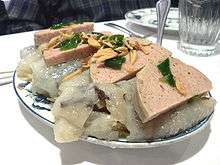

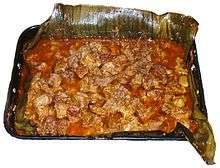 Cochinita pibil is a traditional Mexican slow-roasted pork dish from the Yucatán Península of Mayan origin that involves marinating the meat in acidic citrus juice.
Cochinita pibil is a traditional Mexican slow-roasted pork dish from the Yucatán Península of Mayan origin that involves marinating the meat in acidic citrus juice.
D
E
F
 Pickled eisbein (pickled ham hock), served with sauerkraut. In parts of Germany it is known as schweinshaxe.
Pickled eisbein (pickled ham hock), served with sauerkraut. In parts of Germany it is known as schweinshaxe.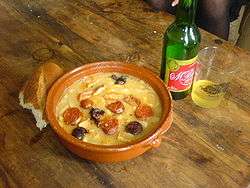
G
H
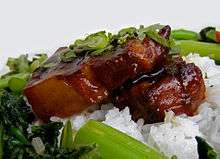
I
J

K
L

M
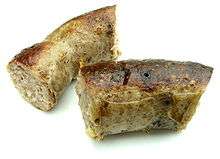 Fried medisterpølse sausage
Fried medisterpølse sausage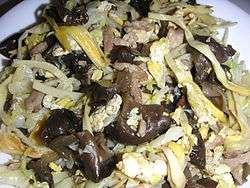
N
O
P
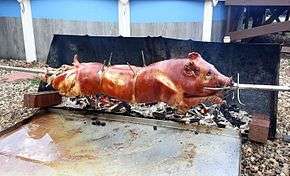
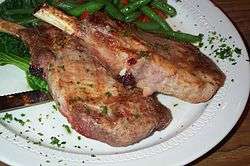
- Pambazo
- Pastie
- Peking pork
- Pickle meat
- Pig fallopian tubes
- Pig roast
- Pig's ear
- Pig's organ soup
- Pig's trotters
- Pizza carbonara
- Porchetta
- Pork and beans
- Pork ball
- Pork blood soup
- Pork chop, sometimes served with applesauce
- Pork chop bun
- Pork knuckle
- Pork Knuckles and Ginger Stew
- Pork pie
- Pork ribs
- Pulled pork
- Pyeonyuk
R
S
- Saksang
- Salsiccia cruda
- Saltimbocca
- Samgyeopsal
- Sarapatel
- Sate babi
- Schweinshaxe
- Schwenker
- Se'i
- Senate bean soup
- Sisig
- Siu yuk
- Skirts and kidneys
- Slavink
- Spiced meat roll
- St. Louis-style barbecue
- Steam minced pork
- Stegt flæsk
- Stuffed chine
- Stuffed ham
- Suckling pig
- Švargl
- Syltelabb
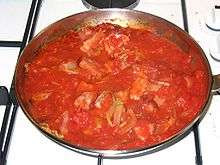
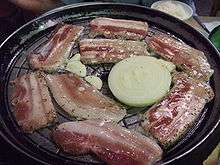 Samgyeopsal is a popular Korean dish that is commonly served as an evening meal. It consists of thick, fatty slices of pork belly meat.
Samgyeopsal is a popular Korean dish that is commonly served as an evening meal. It consists of thick, fatty slices of pork belly meat.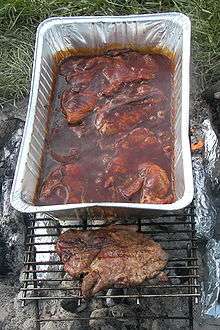 St. Louis-style barbecue – pork steaks cooking
St. Louis-style barbecue – pork steaks cooking- Steam minced pork topped with salted egg and green onion
T
- Tamale
- Taro dumpling
- Pork tenderloin
- Pork tenderloin sandwich
- Tokwa’t baboy
- Tonkatsu
- Tourtière
- Trinxat
- Tuotuorou
- Twice cooked pork
V
W
Y
 Yuxiangrousi, also called fish flavored pork slices, is a common type of Sichuan cuisine.
Yuxiangrousi, also called fish flavored pork slices, is a common type of Sichuan cuisine.
See also
References
- ↑ Raloff, Janet. Food for Thought: Global Food Trends. Science News Online. May 31, 2003.
- ↑ Leistner, Lothar (1999). Lund, Barbara M.; et al., eds. The microbiological safety and quality of food: Volume 1. Gaithersburg: Aspen Publishers. p. 306. ISBN 978-0-8342-1323-4.
- ↑ TVB. "TVB." 廣東菜最具多元烹調方法. Retrieved on 2008-11-19.
- ↑ Hsiung, Deh-Ta. Simonds, Nina. Lowe, Jason. [2005]. The food of China: a journey for food lovers. Bay Books. ISBN 978-0-681-02584-4. p24.
- ↑ Cannon, Gwen, ed. (2010). Michelin Must Sees Shanghai. London: Michelin Apa Publications. p. 133. ISBN 978-1-906261-99-3.
External links
-
 Media related to Pork based food at Wikimedia Commons
Media related to Pork based food at Wikimedia Commons -
 Media related to Pork at Wikimedia Commons
Media related to Pork at Wikimedia Commons


